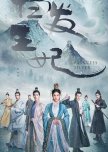Esta resenha pode conter spoilers
Many Stories in One
My overall feeling was that the whole drama was trying to accomplish too much, so the characterization was incomplete. First off, it's hard to relate to a main character who doesn't have her memories, because she herself doesn't even know who she is. There are some other places that made me a little disbelieving and frustrated, as well.
For example, the plot point about the Book of Mountains and Rivers. There was a lot of spying, stealing and seducing involved, but books can be copied, so couldn't it have been redistributed? Yes, there was the theory that only the original holds some sort of military secret, but if that was true, then Hen Xiang would have known it all along, given that she never lost her memories. Hen Xiang's appearance in the drama was a good twist, that did surprise me.
The drama seems to be a misnomer, since Man Yao had silver hair for only a relatively short period of time. Though it did remind me of Danaerys from Game of Thrones, and the action scenes are fairly well choreographed.
The plot point of 2 guys falling for the same woman, but then the guys turned out to be twin brothers, reminded me of Handsome Siblings on Netflix. But that drama was more palatable for its relative simplicity. I would be more shocked by the trope if I hadn't seen that drama first.
The story's moral compass, which is supposed to highlight why Fu Yuan is bad, and Man Yao is good. Fu Yuan chose to pass the poison to her child and remain healthy, whereas Man Yao wanted to give birth to the child and die during or after. This is actually pretty controversial, and I disagreed with the drama's conviction that it is correct for a mother to die for her child if only one of them can live. Abortions also apparently don't exist in this drama's world.
The whole arc in Chen kingdom made the main characters seem slow, because the child emperor is so brilliant by comparison. Not that the original Northern Realm's emperor was around for comparison, but it made his insistence on alliance through political marriage seem extra trite. At least Zhao Yun ended up happy. I also wished the gray characters - Hen Xiang and Fu Chou - didn't have to die. They didn't really get a redemption arc, which undermined the point that children shouldn't have to pay for the sins of the parents. Rong Qi died as well, but the way he died was the most touching thing in the entire drama. I can see why Luo Yun Xi's career got launched from here.
For example, the plot point about the Book of Mountains and Rivers. There was a lot of spying, stealing and seducing involved, but books can be copied, so couldn't it have been redistributed? Yes, there was the theory that only the original holds some sort of military secret, but if that was true, then Hen Xiang would have known it all along, given that she never lost her memories. Hen Xiang's appearance in the drama was a good twist, that did surprise me.
The drama seems to be a misnomer, since Man Yao had silver hair for only a relatively short period of time. Though it did remind me of Danaerys from Game of Thrones, and the action scenes are fairly well choreographed.
The plot point of 2 guys falling for the same woman, but then the guys turned out to be twin brothers, reminded me of Handsome Siblings on Netflix. But that drama was more palatable for its relative simplicity. I would be more shocked by the trope if I hadn't seen that drama first.
The story's moral compass, which is supposed to highlight why Fu Yuan is bad, and Man Yao is good. Fu Yuan chose to pass the poison to her child and remain healthy, whereas Man Yao wanted to give birth to the child and die during or after. This is actually pretty controversial, and I disagreed with the drama's conviction that it is correct for a mother to die for her child if only one of them can live. Abortions also apparently don't exist in this drama's world.
The whole arc in Chen kingdom made the main characters seem slow, because the child emperor is so brilliant by comparison. Not that the original Northern Realm's emperor was around for comparison, but it made his insistence on alliance through political marriage seem extra trite. At least Zhao Yun ended up happy. I also wished the gray characters - Hen Xiang and Fu Chou - didn't have to die. They didn't really get a redemption arc, which undermined the point that children shouldn't have to pay for the sins of the parents. Rong Qi died as well, but the way he died was the most touching thing in the entire drama. I can see why Luo Yun Xi's career got launched from here.
Esta resenha foi útil para você?



